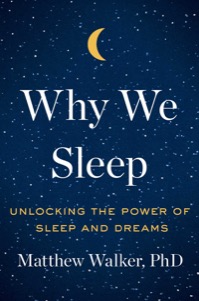
You might think a book about sleep couldn’t possibly be that interesting, but you would be wrong. Why We Sleep is a comprehensive, fascinating and entertaining look at sleep. Generally speaking, most of us are probably already convinced that sleep is a good thing, but we may be fuzzy on why that’s the case. Walker carefully goes over the mental and health benefits that sleep provides (and there are many), explaining what exactly is happening behind the scenes to trigger these benefits.
Our understanding of just what sleep does, as Walker explains, is a relatively recent discovery which is probably why it doesn’t get anywhere near the amount of attention it deserves. As Walker laments, we are taught in school about eating healthy and about exercise, but not about proper sleep habits which is every bit as important. Sleep, on the surface, may seem self-explanatory, but it turns out we do a lot of things (some obvious, some not) that are just plain terrible for our sleep quality. A little education would go a long way, and even over the course of this book, I would be surprised if readers didn’t start to alter their habits (I know I did).
Walker may be passionate about sleep, but he’s also practical. He recognizes that the challenge of fixing the western world’s sleep problem isn’t trivial. There are things we can try to do individually (he provides a full list at the end, as well as additional ideas throughout the book), but there are also broader issues with the way businesses are run, the way schools are run and more.
Because of our underappreciation for sleep, our society is very resistant to these changes. One clear example is the number of people who claim that they only need a few hours of sleep. The numbers show that in actuality, only a fraction of a percent of people truly can operate on less sleep. Everyone else is limiting their emotional stability, mental fortitude, and physical health without realizing it.
He does present some possible solutions but also recognizes that these won’t be easy changes to make. He does provide some examples that offer a glimmer of hope, though. Denmark paying worker compensation to women who developed breast cancer after night-shift work. Aetna providing bonuses to employees based on sleep-tracking data. NASA offering napping time as a way to improve both alertness and on-the-job performance.
Change can happen, even if the examples are too far and few between at the moment. Arming people with the benefits of sleep and the understanding of how sleep works is a great first step, and that’s exactly what this book accomplishes in an engaging and approachable way.
A few highlights:
The physical and mental impairments caused by one night of bad sleep dwarf those caused by an equivalent absence of food or exercise.
...those that abandoned regular siestas went on to suffer a 37 percent increased risk of death from heart disease across the six-year period, relative to those who maintained regular daytime naps. The effect was especially strong in workingmen, where the ensuing mortality risk of not napping increased by well over 60 percent.
There remains a contrived, yet fortified, arrogance in many business cultures focused on the uselessness of sleep.
If the goal of education is to educate, and not risk lives in the process, then we are failing our children in the most spectacular manner with the current model of early school start times.